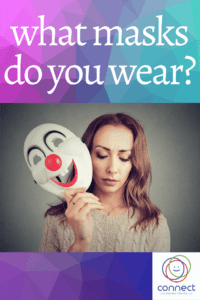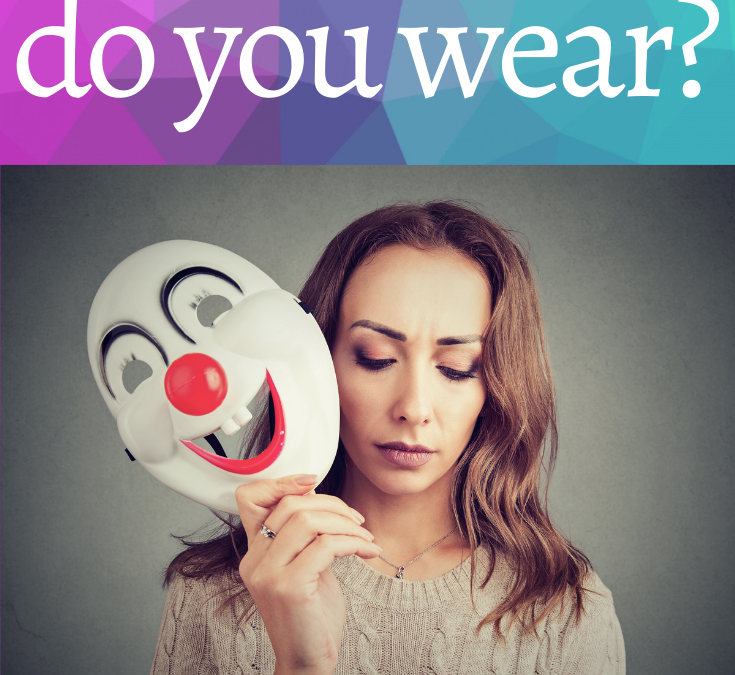 We have been all too familiar with having to wear a mask the past year and a half. Many people are tired of them and some are thriving with them. Masks can be funny, be pretty, represent beliefs, represent favorite sports teams, and even be used to hold snacks in! Some people seem to have a mask for every outfit of every day of the week. These masks can be fun. They can also be incredibly annoying. Some of them are too tight, too itchy, smell bad, or have been dropped on the dirty floor more times than we would like to admit. Masks can be hard to talk in, breathe in, and smile in. They can also provide a certain amount of comfort to those who prefer not to be seen. They can cover blemishes, uneven beard trims, bad lipstick moments, and food in our teeth. I have even been able to yawn with my mouth wide open and not feel self-conscious! These are not the masks I refer to in the title though. While they may have similar characteristics, I am referring to the masks that we were wearing far before the pandemic hit.
We have been all too familiar with having to wear a mask the past year and a half. Many people are tired of them and some are thriving with them. Masks can be funny, be pretty, represent beliefs, represent favorite sports teams, and even be used to hold snacks in! Some people seem to have a mask for every outfit of every day of the week. These masks can be fun. They can also be incredibly annoying. Some of them are too tight, too itchy, smell bad, or have been dropped on the dirty floor more times than we would like to admit. Masks can be hard to talk in, breathe in, and smile in. They can also provide a certain amount of comfort to those who prefer not to be seen. They can cover blemishes, uneven beard trims, bad lipstick moments, and food in our teeth. I have even been able to yawn with my mouth wide open and not feel self-conscious! These are not the masks I refer to in the title though. While they may have similar characteristics, I am referring to the masks that we were wearing far before the pandemic hit.
Do you ever feel like no one truly knows you? That if others did know you, they would not like you? That your true self is not what others are looking for or would be accepted? Maybe you have even considered that if you knew the real you, you would not even like you. That lands hard, feels incredibly vulnerable, and often leads to us covering up with several façades, or masks. Of course, any mask worn is adaptive to whatever environment we are currently in, what we think others would like, what is believed to be the social standard, or what we think is needed to avoid shining light on the parts of us we deem as “bad”. These masks, like the required face coverings of today, can be both necessary and exhausting. Necessary when choosing the appropriate time and place for expressing big emotions. Exhausting in almost every other situation. They can appear stoic, strong, pretty, successful, put together, happy, trendy, and even have the perception of perfection. On the other hand, they can appear moody, mysterious, wounded, and have the perception of being unapproachable. If we are not careful, we no longer own the masks, but the masks own us. We can easily become a slave to the front we display, and an expectation of the façade is produced. It may even begin to feel foreign or uncomfortable to be anything other than a well thought out shell. After all, this way is predictable and has more security. We may feel safe, but we may also begin to feel lonely. We are no longer connected with each other or ourselves on a deep, personal level. Each mask we wear tends to chip away at the solid foundation we first stood on.
We get to pause and ask ourselves a few important questions at this point. Does the mask I wear align with my personal values and characteristics? Is who I am under the mask so different, that no one (maybe including myself) would recognize the person underneath? Am I hiding my authentic self to become the image of greater perceived acceptance? Do I feel that my masks are used in an effort to squash down a part of myself I am embarrassed about but is my truth? If the answers do not sit right with you, then I encourage you to get curious. You are invited to take a moment and get to know the real you by searching inside with deep compassion, courage, and confidence. You are worthy of being known. And who knows, maybe your true self is exactly what the world, your core, or someone else has been looking for or needs, as reflected by this quote from Shel Silverstein:
She had blue skin,
And so did he.
He kept it hid,
And so did she.
They searched for blue
Their whole life through,
Then passed right by-
And never knew.






